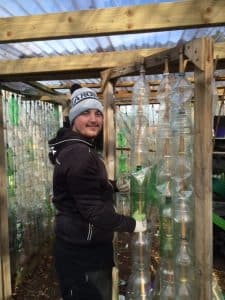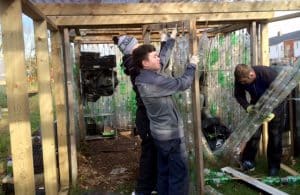The Recycled Plastic Bottle Greenhouse has been a feature of the Green Living and Sustainability (GLAS) Community Garden in Ballymun for the last six years. As the garden hosts more workshops and volunteers, the time came to turn the greenhouse into an outdoor environmental education space! That’s why in November 2017, 14 volunteers from the Ballark Education and Training Centre in Santry helped double its size. The Ballark Education and Training Centre supports young adults jumpstart their careers in the workforce. With their help, we expanded the previously built Plastic Bottle greenhouse to ensure that community members can enjoy a wider range of workshops & activities, even on the rainiest of days.
What is a Plastic Bottle Greenhouse?

The greenhouse features a rainwater harvesting system to maximise our efforts to create a sustainable community garden by sourcing our own water supply from rainwater! Plants prefer rainwater to tap water as the chemicals in tap water for human consumption can be harmful to them.
The new Recycled Plastic Bottle Greenhouse now covers 18 m2 with the capacity of collecting 15.3 Lt of water per 1mm of rainwater with water butts. That means that 61 cups of tea worth of water for every 1mm of rainfall! Throughout the month of November, we had 60mm of rain. As a result, 918 litres, or 3,672 cups of tea worth of rainwater were collected by the GLAS Community Garden Plastic Bottle Green House! With 30 plastic bottles per m2, the Recycled Plastic Bottle Greenhouse saved 1,470 2-litre bottles from a recycling plant, landfill or incinerator.
The Plastic Bottle Greenhouse will now serve as an outdoor education space within the GLAS Community Garden. In the expansion, we made sure to put in standing and sitting benches both inside and out. This makes the space accessible to all ages and people of all abilities.
The Power of Teamwork

From Local Impact to National Possibilities
The newly expanded greenhouse is entirely sustainable. In other words, it factors in all aspects of the Sustainable Development Goals. It considered environmental and economic considerations and resulted in social impact! Students and volunteers from all abilities can learn and enjoy from the garden comfortably, no matter the weather. By including community members in the expansion, young people have the opportunity to work with other age groups. This opens their minds to each other and enhances community engagement, benefiting the wider community in the future.
If every new greenhouse in Ireland were built with recycled plastic bottles and with rainwater harvesting unit, the waste and water savings would be astronomical. The average domestic greenhouse in Ireland is 12 m2. As a result, with the rainfall from November, each greenhouse could collect 720 litres of water, or 2,880 cups of tea! Multiply this by 1,000 greenhouses around the country and that’s 720,000 litres of harvested rainwater in just one month! Additionally, 980 plastic bottles per Bottlehouse could be up-cycled and diverted from landfill or incineration!
Projects like our Recycled Plastic Bottle Greenhouse are the embodiment of GAP Ireland’s mission throughout the world. When communities come together to act sustainably, they strengthen themselves to become global citizens. Recycling and up-cycling may be local actions, but the overall savings in waste and water consumption have a global impact.

